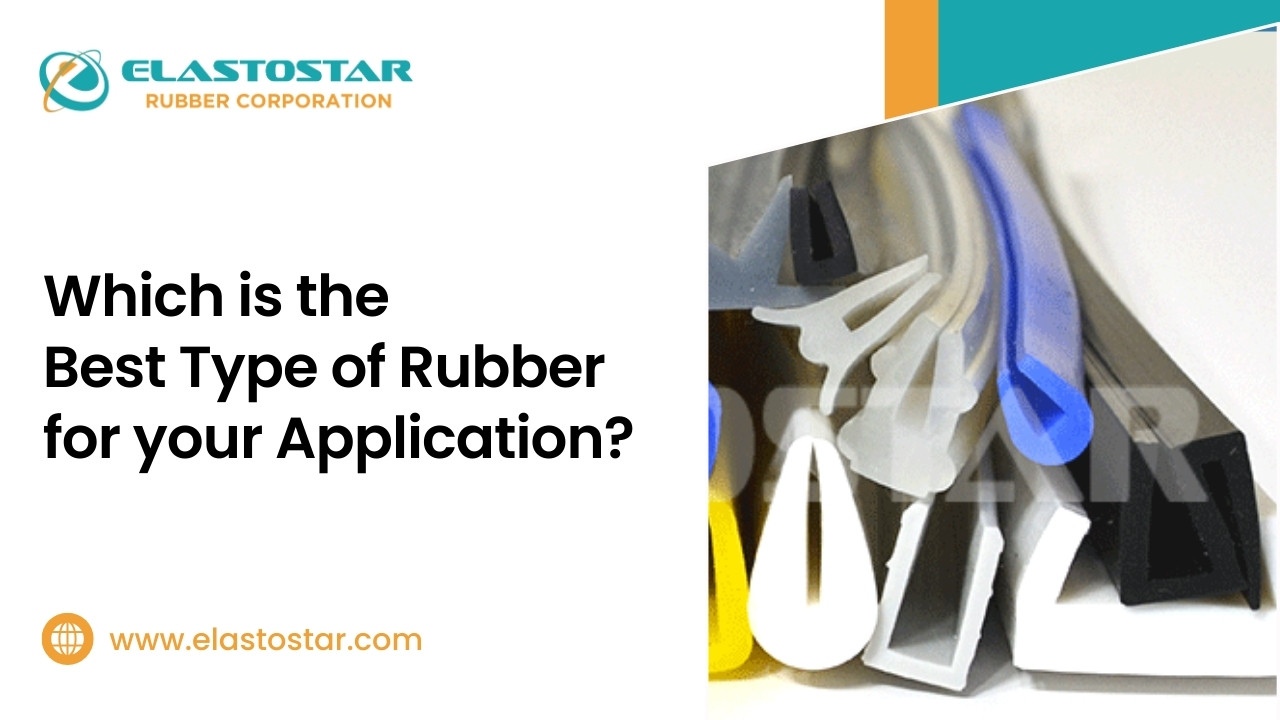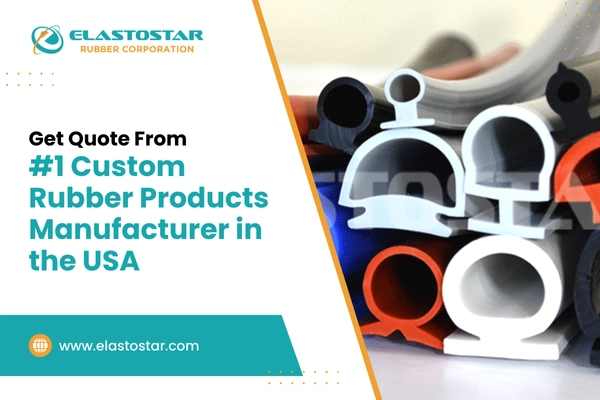Rubber is a material widely used across industries due to its unique rubber properties like durability, flexibility, and resistance to various conditions. Choosing the best type of rubber for your application depends on factors such as temperature range, weather resistance, and specific industrial needs. With a variety of rubber material types like natural rubber, silicone rubber, and Nitrile Rubber (NBR), each type serves unique purposes.
In this blog, we’ll explore the types of rubber materials, their uses for rubber, and how to select the most suitable option for your application.
Table of Contents
What is Rubber?

Rubber is a highly flexible and durable material used in a variety of industries. It is classified into two main categories.
Natural rubber, derived from the sap of rubber trees, and synthetic rubber, made from petrochemicals. Its unique rubber properties, such as elasticity, tensile strength, and weather resistance, make it ideal for applications like seals, gaskets, and industrial components. The type of rubber material chosen depends on the specific needs of the application, making it a crucial component in many industries.
Types of Rubber and Their Properties

Rubber is available in a wide range of types, each with specific properties that make it suitable for certain applications.
Below, we explore some of the most commonly used rubber types and their features.
1. Natural Rubber (NR)
Natural Rubber is derived from the sap of rubber trees and is known for its high elasticity and tensile strength. It offers excellent flexibility and resistance to abrasion, making it suitable for products that require durability and shock absorption.
Common Uses: Tires, conveyor belts, and industrial components.
2. Styrene-Butadiene Rubber (SBR)
SBR is a synthetic rubber that provides good wear resistance and affordability. While it lacks the natural elasticity of rubber, it is highly cost-effective and ideal for applications where abrasion resistance is critical.
Common Uses: Gaskets, seals, and automotive parts.
3. Nitrile Rubber (NBR)
NBR is highly resistant to oils, fuels, and other petroleum-based products, making it an essential material for automotive and industrial applications. It also offers good mechanical strength and resistance to wear.
Common Uses: Gaskets, seals, and fuel pipes.
4. Silicone Rubber
Silicone Rubber is valued for its exceptional heat resistance, flexibility, and inertness. It can withstand extreme temperatures, making it suitable for sensitive applications like medical devices and food-grade products.
Common Uses: Silicone rubber gaskets, tubing, and pipes.
5. EPDM Rubber
EPDM Rubber is a synthetic rubber that excels in UV and weather resistance. It is widely used in outdoor applications due to its ability to resist ozone, sunlight, and moisture.
Common Uses: Roofing materials, automotive weatherstripping, and outdoor seals.
6. Viton® (FKM)
Viton is a fluorocarbon-based synthetic rubber with high resistance to chemicals and extreme heat. It is often used in applications requiring superior performance under harsh conditions.
Common Uses: Aerospace seals, chemical-resistant gaskets, and industrial components.
7. Polyurethane Rubber
Polyurethane Rubber is highly durable and offers excellent abrasion and impact resistance. It is ideal for applications that require strength and wear resistance, such as heavy-duty machinery parts.
Common Uses: Wheels, bushings, and industrial coatings.
For more information on seals and gaskets, including their applications in various industries, check out What is the Importance of Metal Detectable O-Rings? to learn how these specialized rubber products enhance safety and reliability in industries such as food processing.
Properties of Different Rubber Types
| Rubber Type | Key Properties | Common Applications |
| Natural Rubber (NR) | High elasticity, abrasion resistance | Tires, conveyor belts, gaskets |
| Styrene-Butadiene (SBR) | Cost-effective, wear-resistant | Automotive parts, seals, gaskets |
| Nitrile Rubber (NBR) | Oil and fuel resistance | Fuel pipes, industrial seals |
| Silicone Rubber | Heat resistance, flexibility | Medical devices, silicone gaskets |
| EPDM Rubber | UV and weather resistance | Roofing, outdoor seals |
| Viton® (FKM) | Chemical and heat resistance | Aerospace, chemical seals |
| Polyurethane Rubber | Abrasion and impact resistance | Wheels, bushings, machinery parts |
Factors to Consider When Choosing Rubber
When selecting the right rubber for your application, several important factors should be considered to ensure optimal performance.
1. Environmental Conditions
Will the rubber face UV, ozone, or extreme weather? EPDM Rubber and Neoprene Rubber are ideal for outdoor applications, offering excellent resistance to UV rays and weathering.
2. Temperature Range
For extreme heat, silicone rubber tubing or Viton is the best choice due to its high-temperature resistance. For moderate temperature ranges, Nitrile Rubber works effectively, especially in automotive or industrial environments.
3. Chemical Compatibility
If the rubber comes into contact with oils, fuels, or strong chemicals, NBR and Viton offer excellent chemical resistance, ensuring durability and preventing degradation.
4. Strength and Hardness
Polyurethane Rubber offers exceptional abrasion resistance, making it ideal for applications that require strength. On the other hand, Natural Rubber provides superior elasticity, making it suitable for flexible products.
5. Customization and Manufacturing
Customized solutions such as extruded rubber products are perfect for specific industrial needs. These solutions cater to unique design specifications, ensuring optimal fit and function.
For more on rubber seals and gaskets, particularly their role in chemical compatibility and strength, check out Top 7 Benefits of Using Metal Detectable Seals & Gaskets, which explains how metal detectable seals enhance safety and reliability in industrial applications.
What are the best Applications of Rubber?
Rubber is used in a wide variety of industries, with different types of rubber offering unique benefits for specific applications.
1. Automotive Industry
NBR is commonly used for fuel hoses, seals, and gaskets due to its excellent resistance to oils and fuels. SBR is a popular choice for tire and belt production because of its good wear resistance and cost-effectiveness.
2. Medical and Food Industries
Silicone Rubber is ideal for FDA-compliant tubing, gaskets, and rings due to its safety, flexibility, and heat resistance. It is widely used in medical devices and food processing applications.
3. Construction and Industrial
EPDM Rubber is used for roofing and weatherproofing due to its exceptional UV and ozone resistance. Polyurethane Rubber is ideal for abrasion-resistant coatings, making it perfect for industrial machinery and equipment.
These applications highlight how different types of rubber are tailored to meet the needs of various industries, ensuring reliability and durability in diverse environments.
Why Choose Elastostar Rubber Corporation?
Elastostar Rubber Corporation, we specializes in manufacturing high-quality rubber products, including custom rubber seals, gaskets, and extruded rubber products. With extensive expertise and other innovative solutions, we provide customized products to meet the specific needs of various industries.
Our commitment to durability, reliability, and performance ensures that all our products are built to the highest standards, offering dependable solutions for your applications.
Recommended Reads
- What Is EPDM Rubber? Meaning, Benefits, and Applications
- Why FDA-Approved Silicone Rubber is Preferred for Food Industry Gaskets and Seals
- Top 8 Benefits of Using Rubber Seals and Gaskets for Industrial Applications

Conclusion
Choosing the right rubber for your application is essential to ensure it performs well and lasts. It’s important to consider factors like the rubber’s properties, how it will stand up to environmental conditions, and its ability to resist chemicals. By understanding these factors and your specific needs, you can select the best rubber type for reliable and long-lasting results.
FAQs
1. What Is the Best Rubber for Marine Applications?
The best rubber for your application depends on factors like environmental conditions, temperature, and chemical exposure. At Elastostar Rubber Corporation, we specialize in providing high-quality rubber products like Nitrile Rubber (NBR) for oil resistance and Silicone Rubber for high-temperature applications. Our team can help guide you in selecting the best material based on your specific needs.
2. What Is the Full Form of EPDM Rubber?
The full form of EPDM is Ethylene Propylene Diene Monomer, a type of synthetic rubber known for its excellent resistance to heat, UV radiation, and weathering.
3. What Is High-Quality Rubber?
High-quality rubber is durable, flexible, and resistant to wear, heat, and chemicals. It should maintain its properties under stress and environmental conditions, ensuring longevity and consistent performance.
4. What Is the Cheapest Type of Rubber?
SBR (Styrene-Butadiene Rubber) is one of the most affordable types of rubber, offering good performance for general applications, such as automotive tires and gaskets.
5. Which Rubber Is Strong?
Polyurethane Rubber is one of the strongest rubber types due to its high resistance to abrasion and impact, making it ideal for heavy-duty applications that require durability.
6. How Do I Choose the Right Rubber for My Needs?
Choosing the right rubber involves understanding the properties required for your application. Whether you need abrasion resistance, chemical resistance, or flexibility, Elastostar Rubber Corporation offers customized solutions. Our expert team can help you evaluate factors like temperature range, strength, and environmental conditions to choose the most suitable rubber material.



